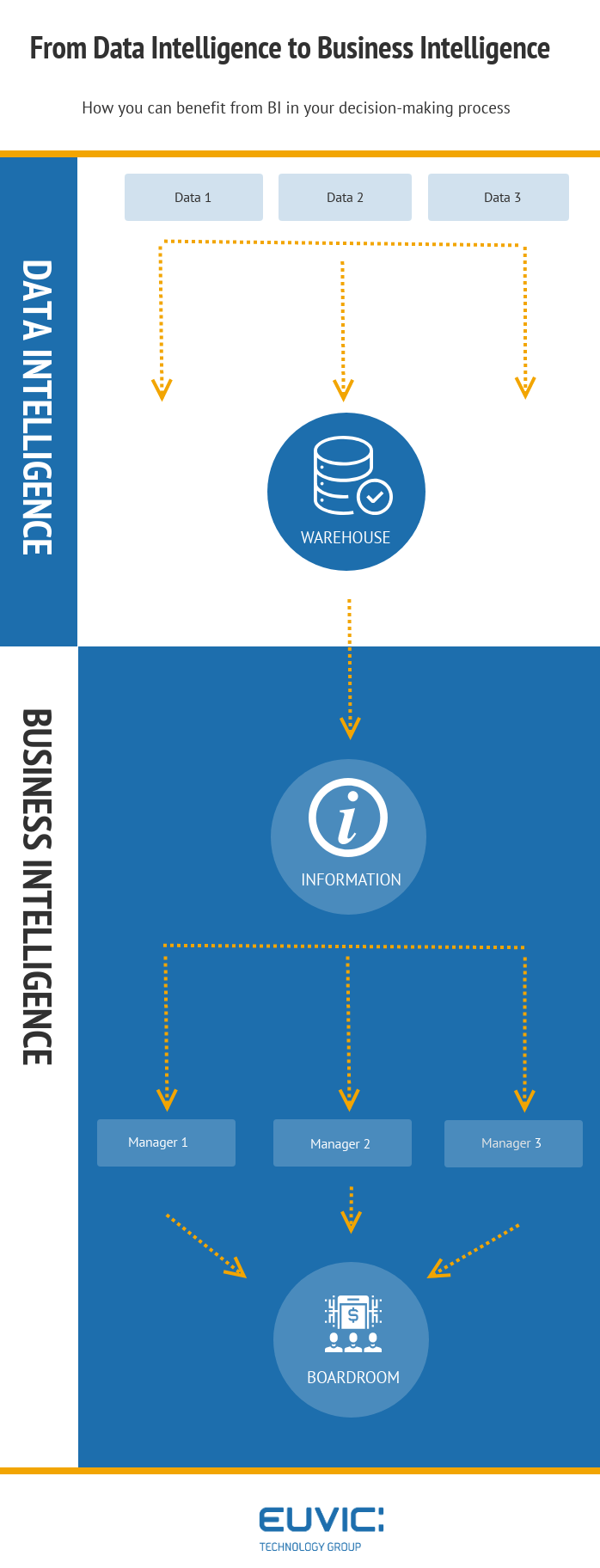
Business Intelligence: How can your company fully benefit from it?
4 March 2019
Every two days we create as much data as we did from the beginning of time until 2003. For a typical Fortune 1000 company, just a 10 percent increase in data accessibility will result in more than 65 million dollars of additional net income. However, companies process and use only a small percentage of the information collected. No wonder that Business Intelligence is one of the hottest topics today.
Information is power – it’s a truism (but true!). However, information has value only if it is structured. Business Intelligence involves organizing and analyzing various forms of data in such a way that it can be used by companies to expand their services or investments.
The aim of Business Intelligence is to transform and unify the data collected over the course of the company’s operations, and then generate advanced analyses on the basis of which the company can change e.g. its production process, direction of expansion or product offer. Business Intelligence operates based on Data Intelligence, which structures the information so that it can be processed.
In order for Data Intelligence to be successful, we need data warehouses responsible for downloading, storing and standardizing information. Adapting the data format to BI solutions makes, for example, data from several different sources consistent and analyzable. The analyzed data are fed into applications dedicated to employees, such as, for example, management cockpits, where decision-makers only see the necessary information. By giving access only to management cockpits and already structured data, the manager does not have to look for information or engage IT support.

Since every business is different, Business Intelligence systems are created in the form of dedicated applications. Implementation is preceded by analysis to determine what kind of data can be supplied by data warehouses and what information the management and employees care about. BI systems are used in many industries, such as for example:
1. Finance
One of the pioneers using BI in finance is American Express, which has implemented the technology to develop new payment service products and market offers for customers. According to CCS Technology Group, American Express experiments in the Australian market have rendered it capable of identifying up to 24% of all Australian users who will close their accounts within four months. Based on this information, the company could effectively fight for customer retention. BI also helps American Express to improve fraud detection and protect customer data more effectively.
2. Oil industry
Business Intelligence helps oil companies reduce their costs and raise profits. When drilling for oil, analysts combine data from geological and seismic tests to determine where to drill and the best means to do it. Thanks to this, the cost of raw material extraction can be kept under control. Also the marketing departments of oil companies benefit from BI. Price of a barrel of crude oil can change several times a day. Thanks to BI, the marketing department knows the price in real time and can push sales when the price is high, and pull back when the price is low – explains the article at christiansteven.com.
3. Sport
The Boston Celtics basketball club creates promotions for their fans based on who they are, where they sit and how much they are willing to pay for the tickets. Business Intelligence helps the sales department analyze how much revenue a given seat brings in a season, and compare the different areas of the stadium. According to Data Pine, the Celtics have over a hundred different ticket prices, which are precisely targeted at selected recipients. The club raises more money, part of which is reinvested in the players and their training.
4. Fashion
Analyzing and predicting trends, understanding customer needs and anticipating sales volume – these are just a few of the benefits that the fashion business can gain from using BI. The main cause of losses in this industry are miscalculated production volumes. Accurate forecasting of demand allows to avoid storehouses full of clothes from previous seasons, for which there are no customers. And the right customer profile allows you to offer him collections that he is very likely to buy. BI also means being able to analyze the size of your customers’ baskets and what they usually buy together – explains infosuite.com.
5. Pharmacy
Business Intelligence helps Roche, a global medical corporation, create a sales and marketing strategy for their products for over 100 different countries. Thanks to the platform build by Euvic, Roche management gains standardized reports based on unified data from all the regions the company operates in. This means better identification of the needs and absorption capacity of individual markets and higher control over the supply channel. In case of medical companies, Business Intelligence can also support strategic and cost-intensive decisions such as a production of a new drug.
back